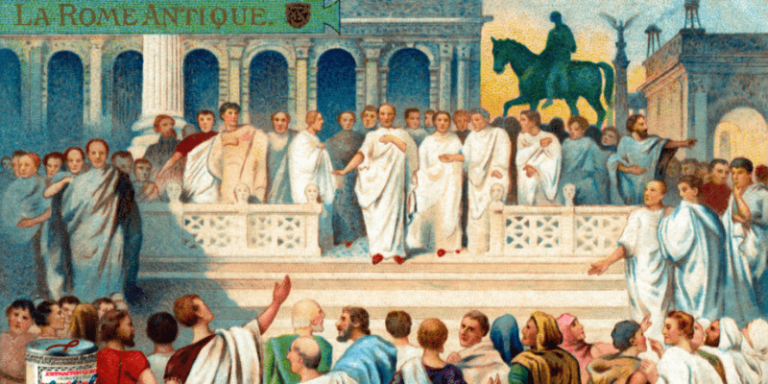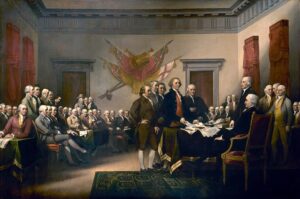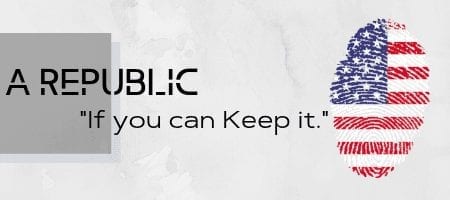A Primer on Republics
People often call the U.S. a democracy … it isn’t.
By: Andrew Moran | April 27, 2021 | 645 Words

Republic of ancient Rome. (Photo by Culture Club/Getty Images)
A republic is a government being ruled by representatives voted for and elected by the citizens. Although the people do not govern the nation themselves, they exercise their power by choosing elected officials to represent their needs and decisions in the state or nation’s capital. Article IV, Section 4 of the U.S. Constitution declares, “The United States shall guarantee to every State in this Union a Republican Form of Government.”
Types of Republics
There are many different types of republics. The U.S. functions as a federal and presidential republic. The country has states that possess some degree of authority over themselves and maintains a president who leads the nation. Argentina, Brazil, Austria, Russia, and Venezuela are other examples of federal-presidential republics.

Proclamation of the French Republic, 1848. Artist Laurens, Jean-Paul (1838-1921). (Photo by Fine Art Images/Heritage Images via Getty Images).
The other kinds of republics from across the globe:
- Unitary: Divisions, like states or provinces, are governed as a single unit with one legislature (Ireland or France).
- Parliamentary: The government operates by a parliamentary system with a prime minister as head of state (Greece and Israel).
- Islamic: A country that is ruled by theocracy and a constitution that is based on Islamic law (Iran and Pakistan).
But what about a banana republic? This term is thrown around a lot, but this is not an official form of government. Instead, it a disparaging way to describe a government seen as being problematic or tyrannical.
Republics – Ancient and Modern
The term Republic wasn’t used in the ancient world – but the Republican ideas were, so we call many ancient nations republics. In the ancient era, from 3000 B.C. to the fifth century, the most well-known republics were the Roman Republic, Classical Athens, and Ancient Carthage. In the 21st century, several republics have formed, including the State of Anjouan, the Democratic Republic of Timor-Leste, the Republic of Kosovo, and the Catalan Republic.

The signing of the Declaration of Independence in Philadelphia on July 4th, 1776. Painting by John Trumbull. (Photo by GraphicaArtis/Getty Images)
What the Founders Envisioned
The Founding Fathers dreamed of a nation of life, liberty, and the pursuit of happiness. They understood the dangers of a monarch, but they wanted to refrain from applying the aspects of democracy over concerns of “tyranny of the majority” as Alexis de Tocqueville, the famous French theorist, wrote. The country’s founders embraced the ideas of republicanism to establish the republic, and it is evident in everything during the American Revolution, from the Declaration of Independence to the Constitution.
Some of the core principles of republicanism that the Founders wanted to apply to the republic were natural rights, sovereign people, power should be given by the people and not inherited, and corruption has no place in a republic. They also wanted limited powers, routine checks and balances, and for change in the nation’s fabric to occur slowly. The purpose was concern that a majority of voters would ditch their rights and freedoms.
 As former President John Adams said, “You will never know how much it has cost my generation to preserve your freedom. I hope you will make a good use of it.”
As former President John Adams said, “You will never know how much it has cost my generation to preserve your freedom. I hope you will make a good use of it.”
A Republic – If You Can Keep It
Is the republic on the precipice of destruction? In recent years, it seems that America’s character is being diminished, and the principles of the planet’s greatest experiment are being tossed into the trash. In addition to the abandonment of the Constitution, the toxic political divide is eroding the American spirit and fostering enormous disdain between Republicans and Democrats. Perhaps everything unfolding today is what Franklin was warned about when he explained that they had built “a republic, if you can keep it.” Will the republic fall, or will it stand the test of time?
















